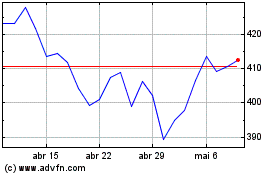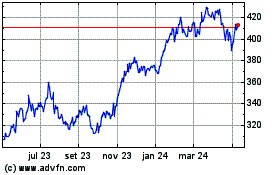By Amrith Ramkumar
This article is being republished as part of our daily
reproduction of WSJ.com articles that also appeared in the U.S.
print edition of The Wall Street Journal (January 17, 2020).
Google parent Alphabet Inc. became the fourth U.S. company ever
to achieve a $1 trillion market value Thursday, punctuating a
powerful rally in shares of large internet stocks to start
2020.
The search-engine giant joins peers Apple Inc., Amazon.com Inc.
and Microsoft Corp. as the only firms to reach the threshold during
intraday trading. Apple and Amazon accomplished the feat in the
summer of 2018, while Microsoft hit $1 trillion for the first time
in April of last year. Amazon never closed above $1 trillion and
has fallen well behind Apple and Microsoft, which have rocketed
past that level recently.
The massive gains for technology stocks come with Silicon Valley
companies ascending to the forefront of the world economy and
flexing their muscles in new arenas such as health care and
transportation. Despite concerns about stricter regulatory
scrutiny, the biggest technology companies have continued soaring
in value, highlighting how investors favor firms that steadily
improve sales in a world with tepid economic growth and low
interest rates.
Google faces investor concerns about antitrust probes into its
dominance in advertising and rising costs. Those worries have put
Alphabet shares behind the pace of many of its technology peers in
the past year, but many investors remain confident the company can
continue growing consistently.
"Google is one of those critical, important leaders in multiple
areas," said Michael Lippert, who manages the Baron Capital
Opportunity Fund that counts Alphabet among its largest holdings.
"You almost can't live your life without Googling things."
Alphabet shares have surged since the company said in early
December that Google co-founders Larry Page and Sergey Brin were
stepping down from managing the parent company and ceding control
to Google Chief Executive Sundar Pichai. Analysts have suggested
Mr. Pichai could further buoy the stock either by increasing
buybacks or potentially instituting a dividend payment for the
first time in the company's history because a chunk of his bonus is
tied to share performance.
That anticipation has helped fuel gains ahead of the company's
fourth-quarter earnings report, which is scheduled for early next
month. Citing a potential "shareholder-friendly" approach from Mr.
Pichai, Deutsche Bank analysts recently raised their price target
on Alphabet shares to $1,735, which would mark a roughly 20%
increase from their Thursday level.
Even shares of smaller companies seen as disruptive and having
outsize growth potential have soared in the new year, including
electric-auto maker Tesla Inc. and plant-based meat-alternative
maker Beyond Meat Inc. The broad gains have helped drive major
indexes to records.
Although Alphabet has had to combat rising costs, the resilience
of its core online advertising business has continued to buoy the
stock.
"It's really been a cash cow," said Dan Morgan, a senior
portfolio manager who focuses on tech at Synovus Trust Co., which
owns Alphabet shares. "They've been steadily continuing to post 15%
to 20% growth, which is pretty amazing when you consider how mature
that model is."
Alphabet's Class A shares advanced 0.8% Thursday, combining with
a rally in its Class C shares, which carry no voting rights, to
lift the company's market value above $1 trillion at the end of
Thursday's session. The Class A shares are up 33% in the past year,
exceeding a 27% rally in the S&P 500.
The largest five companies in the S&P 500 -- Apple,
Microsoft, Alphabet, Amazon and Facebook Inc. -- now account for
about 19% of the index in terms of weighting. Five years ago, the
largest five components in the broad equity gauge made up 12%,
illustrating the growing dominance of a handful of the biggest tech
stocks.
"When growth is scarce, investors are willing to pay up for any
company that's able to deliver," said Amanda Agati, chief
investment strategist at PNC Financial Services Group. "It's been a
very long, slow, sluggish economic growth cycle."
Apple is now approaching a $1.4 trillion market cap, while
Microsoft is at $1.27 trillion and Amazon is at $931 billion.
Facebook stands at $633 billion.
The concentrated gains have fueled concerns that a pullback in
the leading tech shares could drag down the entire market. But
major indexes have shaken off brief selloffs in recent years to
rally to records. The S&P 500 just logged its biggest annual
gain since 2013 with trade tensions receding and interest rates
around the world falling.
Following years of steady returns, investors also are debating
whether the largest internet stocks have gotten too pricey.
Alphabet shares trade at 31 times the company's earnings in the
past year, in line with its 10-year average. Microsoft has a
similar valuation, while Apple trades at 26.5 times earnings and
the S&P 500 at 22 times. Other popular internet stocks Amazon
and Netflix Inc. have valuations north of 80.
Alphabet was created in 2015 when Google formed a new parent
company to separate its core business from a host of other segments
focused on everything from robotics to self-driving cars. The firm
has benefited from its acquisitions of YouTube and internet
advertising company DoubleClick Inc. more than a decade ago and
made more deals since to create a dominant digital ad machine.
Google went public in August 2004, making its time as a public
company and rally to a $1 trillion market value much shorter than
that of other technology giants. Apple and Microsoft became public
companies in the 1980s, while Amazon's initial public offering took
place in 1997.
It has taken Alphabet only a few months to boost its market
capitalization -- calculated by multiplying its share count for
each class of shares by the price -- from $900 billion to $1
trillion. That marks the company's fastest such $100 billion
advance, according to Dow Jones Market Data. Alphabet took almost
two years to go from $800 billion to $900 billion in November.
Write to Amrith Ramkumar at amrith.ramkumar@wsj.com
(END) Dow Jones Newswires
January 17, 2020 02:47 ET (07:47 GMT)
Copyright (c) 2020 Dow Jones & Company, Inc.
Microsoft (NASDAQ:MSFT)
Gráfico Histórico do Ativo
De Dez 2024 até Jan 2025

Microsoft (NASDAQ:MSFT)
Gráfico Histórico do Ativo
De Jan 2024 até Jan 2025
